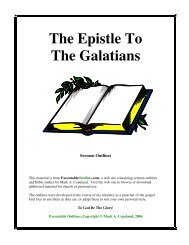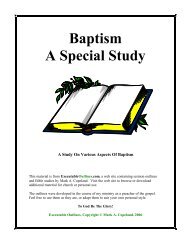The Epistle To The Hebrews - Executable Outlines
The Epistle To The Hebrews - Executable Outlines
The Epistle To The Hebrews - Executable Outlines
You also want an ePaper? Increase the reach of your titles
YUMPU automatically turns print PDFs into web optimized ePapers that Google loves.
. But now, in Christ we can all “draw near” to God in worship and prayer!<br />
Mark A. Copeland<br />
C. THIS WE CAN DO “BOLDLY”...<br />
1. This word means “with confidence” (Gr., parresia, meaning “full story”)<br />
2. In ancient Greece...<br />
a. It was used to describe the right of a citizen to speak his mind on any subject in the<br />
town assembly (Lightfoot)<br />
b. Only “full citizens” had this right, slaves did not<br />
3. As used here in <strong>Hebrews</strong>, it stands for our freedom to approach God...<br />
a. Without hesitation or inhibitions<br />
b. Made possible by the blood of Jesus - cf. He 10:19-22<br />
[And so this passage speaks of the wonderful privilege Christians have through prayer to approach our<br />
gracious God, with full confidence that He hears our prayers! It is important to utilize this privilege, and<br />
in our text we find several reasons for doing so...]<br />
II. WHY WE OUGHT TO “COME BOLDLY TO THE THRONE OF GRACE”<br />
A. BECAUSE WE HAVE YET TO ENTER “THE REST THAT REMAINS”...<br />
1. As seen earlier in this chapter, there is still a promised “rest” for the people of God<br />
a. We need to “fear” lest we come short of it - He 4:1<br />
b. We need to be “diligent” - He 4:11<br />
2. This being true, we need all the “mercy” and “grace” we can find!<br />
B. BECAUSE OF THE “HIGH PRIEST” THAT WE HAVE...<br />
1. In Jesus we have a “great” High Priest - He 4:14<br />
a. One who has “passed through the heavens” - cf. He 9:24; 7:26-27<br />
b. Having ascended to the right hand of God, He has become “higher than the heavens”!<br />
2. In Jesus we have a “sympathetic” High Priest - He 4:15<br />
a. <strong>The</strong> word “sympathy” literally means “to suffer with”<br />
1) <strong>The</strong> Greek word suggests an intensity that is lost in the English word “sympathy”<br />
(Lightfoot)<br />
2) Westcott describes it as “the feeling of one who enters into the suffering and makes<br />
it his own.”<br />
b. Jesus’ sympathy is due to being “tempted as we are, yet without sin.”<br />
1) This qualifies Him to be a “merciful and faithful” High Priest - He 2:17<br />
2) One who is “able to aid those who are tempted” - He 2:18<br />
3. With such a High Priest interceding for us, shall we not take advantage of Him while we<br />
can? - cf. He 7:24-25<br />
a. Especially since He is able “save to the uttermost those who come to God through Him”<br />
b. And since He “always lives to make to make intercession for them”<br />
-- Does this not encourage us to “come boldly to the throne of grace”?<br />
C. BECAUSE OF THE “MERCY” AND “GRACE” THAT AWAITS...<br />
1. Christians continue to need two things throughout their lives:<br />
a. “mercy”<br />
1) I.e., forgiveness for our sins<br />
2) For we do sin; to deny that is to call God a liar - cf. 1 Jn 1:8,10<br />
b. “grace to help in time of need”<br />
Sermons From <strong>Hebrews</strong> 35

















